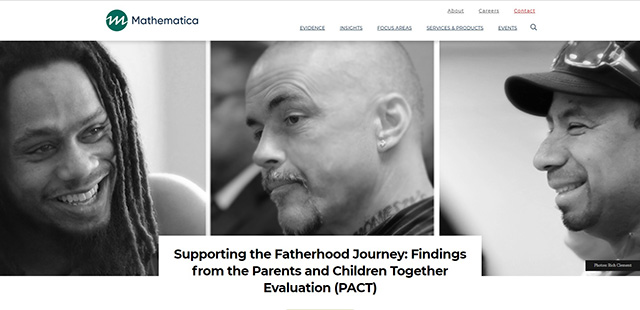Healthy Marriage and Relationship Education programs, funded by the U.S. Department of Health and Human Services (HHS), offer services to help strengthen the relationships of low-income couples with children. These programs are sometimes supplemented by job and career advancement services to help couples improve their financial stability. According to a new study by Mathematica Policy Research, 85 percent of married and unmarried couples who were randomly assigned to two programs attended at least one session of a workshop designed to support and strengthen their relationships. About 65 percent attended at least half of the relationship education sessions. In contrast, relatively few attended the job and career advancement sessions that were offered. These and other findings from an implementation report on the Parents and Children Together (PACT) evaluation shed light on both the challenges and promising practices in implementing programming in combination with job and career services.
In a process study that is part of the PACT evaluation, commissioned by the HHS Office of Planning, Research and Evaluation (OPRE), Mathematica researchers examined programs operated by two organizations awarded grants in 2011—the Healthy Opportunities for Marriage Enrichment (HOME) program, operated by the El Paso Center for Children in Texas, and the Supporting Healthy Relationships program, operated by University Behavioral Associates in the Bronx, New York. Both programs, which enrolled a total of 1,595 low-income couples between July 2013 and April 2015, were designed to enhance participants’ relationship skills as well as their financial well-being, which is a significant cause of stress for many relationships.
Nearly 8 in 10 couples participating in the voluntary programs reported that the primary reason they enrolled was to improve their relationship with their partners. Couples participating in focus group discussions said they learned valuable techniques and skills from the relationship education programming, including anger management and communication, and that they could apply those skills in their relationships.
The process study revealed that only 13 percent of HOME couples and 33 percent of Supporting Healthy Relationships couples attended one of the standalone workshops that focused exclusively on job and career advancement. This limited participation in job and career service offerings may reflect intentional choices by participants. In most families, at least one member of the couple was employed. Although almost two-thirds (63 percent) of the couples reported earning $2,000 or less in the month before enrollment, just 7 percent indicated that improving their job situation was the motivating factor for their participation. Programs may have attracted couples with less interest in job and career services because outreach efforts focused primarily on the relationship education workshop.
Additional findings from the study include:
- The programs encouraged strong participation by proactively addressing barriers to attendance—helping with transportation and child care, offering scheduling flexibility, and giving participants opportunities to make up missed sessions. Couples were receptive to messages in which the relationship education workshop was called a “date night” for which the logistics would be covered.
- Participation in the relationship education workshop may have resulted in part from the programs’ efforts to enroll only couples who reported being in a committed relationship.
- Case managers supported couples by working to address their housing, food security, and medical assistance needs. They also encouraged couples’ ongoing attendance at the relationship education workshop.
- The demographic characteristics of program staff reflected those of the program participants. More than 80 percent of staff across both programs identified themselves as Hispanic, while 74 percent of the couples reported that both partners were Hispanic.
- Staff expertise reflected the programs’ emphasis on relationship skills. Two-thirds of the staff had experience providing relationship education, and 50 percent had experience providing employment services.
Looking forward
The findings suggest that grantees should continue offering a range of formats and strategies that enhance participation in the relationship education workshop, including child care and transportation. Programs could also find ways to more closely match job and career advancement services to participant needs. For example, content designed to build financial literacy and money management skills could be integrated into workshops that focus on relationship skills. To better understand drivers of program participation, researchers could test whether the connection between couples’ level of commitment to their relationships at enrollment affects program participation.
The Healthy Marriage process study is part of OPRE’s PACT evaluation, which is being conducted by Mathematica. Results from the PACT evaluation are contributing to the evidence base for policies and programs that support families—by expanding what we know about people who voluntarily enroll in healthy relationship or responsible fatherhood programs, revealing how those programs are designed and operated, and describing how the programs affect participating families.
Read the full report, “Parents and Children Together: Design and Implementation of Two Healthy Marriage Programs.”
Learn more about the PACT evaluation and other Mathematica research on projects to support and strengthen families.


